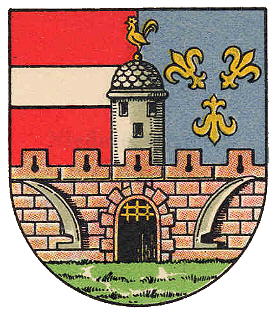Hainfeld (Niederösterreich): Difference between revisions
Jump to navigation
Jump to search
Knorrepoes (talk | contribs) m (Text replace - "'''Origin/meaning :'''<br>" to "====Origin/meaning====") |
Knorrepoes (talk | contribs) m (Text replace - "|width="15%"|50 px|right |}" to "|width="15%"|50 px|right |}<seo title="Wappen, Gemeindewappen" />") |
||
| Line 3: | Line 3: | ||
|width="70%" align="center" |'''Heraldry of the World<br>Civic heraldry of [[Austria]] - [[Austria|Österreichische Gemeindewappen]]''' | |width="70%" align="center" |'''Heraldry of the World<br>Civic heraldry of [[Austria]] - [[Austria|Österreichische Gemeindewappen]]''' | ||
|width="15%"|[[File:Austria.jpg|50 px|right]] | |width="15%"|[[File:Austria.jpg|50 px|right]] | ||
|} | |}<seo title="Wappen, Gemeindewappen" /> | ||
'''HAINFELD''' | '''HAINFELD''' | ||
Revision as of 12:43, 7 November 2012
| Heraldry of the World Civic heraldry of Austria - Österreichische Gemeindewappen |
HAINFELD
State : Niederösterreich
District : Lilienfeld
Origin/meaning
The arms were granted on January 2, 1583 and again in 1965.
The arms show a city gate as symbol for the city itself. The rooster on the tower symbolises vigilance. The silver bar in red shows the arms of Austria. The fleur-de-lys are taken as canting elements from the arms of the Lilienfeld Convent. The convent acquired the jurisdiction over the village in 1369 from Duke Albrecht III of Austria.
The two scythes symbolise the importance of the metal industry, especially scythes, for the city at the time.
Literature : Image from the Coffee Hag album +/- 1932; Ströhl, 1904

